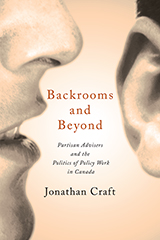
Backrooms and Beyond: Partisan Advisors and the Politics of Policy Work in Canada
Though they serve in many roles and under many titles, no one doubts that political staffs now wield substantial influence in the making of government policy. Backrooms and Beyond draws on interviews with ministers, senior public servants, and political advisers to offer the first detailed Canadian treatment of how that influence is gained and exercised in the policy making process.
A comparative analysis of case studies from three Canadian jurisdictions, including the federal Prime Minister’s Office, two premier’s offices, and ministers’ offices, the book presents a detailed account of partisan advisers’ involvement in policy work and a new theoretical framework for understanding this work and its impact. As Jonathan Craft shows, partisan advisers often engage in policy work with public servants, outside stakeholders, and often in types of policy work that public servants cannot.
Backrooms and Beyond is a rich and rigorous look at an important aspect of contemporary Canadian politics, essential reading for scholars and practitioners, journalists, students of the Westminster system from around the world, and those wanting to understand just how policy is made today.
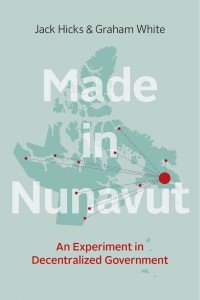
Made in Nunavut
Made in Nunavut provides the first behind-the-scenes account of how the Government of Nunavut (GN) came into being, exploring the many political and administrative issues that arose in its design and implementation. The book offers a close analysis of the period between the passage of the Nunavut Act in 1993 and the start-up of the GN in 1999, paying close attention to its most distinctive and innovative organizational design feature — the decentralization of offices and functions that would normally be located in the capital to small communities spread across the vast territory. It examines how this decentralization was implemented post-1999 and concludes by taking a hard look at whether the GN’s controversial structure has provided better government for the people of Nunavut.
The result of nearly two decades of research and writing by leading authorities on the politics of the Canadian Arctic, Made in Nunavut is a definitive guide to understanding the structure and politics of Canada’s youngest territory.
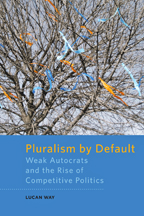
Pluralism by Default
Pluralism by Default explores sources of political contestation in the former Soviet Union and beyond. Lucan Way proposes that pluralism in “new democracies” is often grounded less in democratic leadership or emerging civil society and more in the failure of authoritarianism. Dynamic competition frequently emerges because autocrats lack the state capacity to steal elections, impose censorship, or repress opposition. In fact, the same institutional failures that facilitate political competition may also thwart the development of stable democracy.
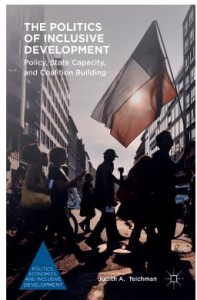
The Politics of Inclusive Development
JuThis book investigates the political conditions and policies most likely to bring about progress toward inclusive development, drawing on four cases studies with distinct development trajectories. It argues that this progress is primarily a political struggle, one requiring a committed leadership with broadly based societal support.

The Canadian Environment in Political Context
The Canadian Environment in Political Context is an introduction to environmental politics designed to explain and explore how environmental policy is made inside the Canadian political arena. The book begins with a brief synopsis of environmental quality across Canada before moving on to examine political institutions and policymaking, the history of environmentalism in Canada, and crucial issues including wildlife policy, pollution, climate change, Aboriginals and the environment and Canada’s North. The book ends with a discussion of the environmental challenges and opportunities that Canada faces in the twenty-first century. Accessible and comprehensive, The Canadian Environment in Political Context is the ideal text for environmental politics and policy courses.
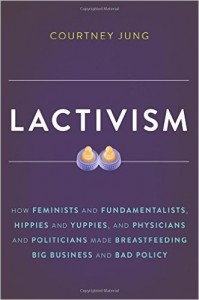
Lactivism – How Feminists and Fundamentalists, Hippies and Yuppies, and Physicians and Politicians Made Breastfeeding Big Business and Bad Policy
Social scientist and mother Courtney Jung explores the ever-expanding world of breastfeeding advocacy, shining a new light on the diverse communities who compose it, the dubious science behind it, and the pernicious public policies to which it has given rise
Is breast really best? Breastfeeding is widely assumed to be the healthiest choice, yet growing evidence suggests that its benefits have been greatly exaggerated. New moms are pressured by doctors, health officials, and friends to avoid the bottle at all costs—often at the expense of their jobs, their pocketbooks, and their well-being.
In Lactivism, political scientist Courtney Jung offers the most deeply researched and far-reaching critique of breastfeeding advocacy to date. Drawing on her own experience as a devoted mother who breastfed her two children and her expertise as a social scientist, Jung investigates the benefits of breastfeeding and asks why so many people across the political spectrum are passionately invested in promoting it, even as its health benefits have been persuasively challenged. What emerges is an eye-opening story about class and race in America, the big business of breastfeeding, and the fraught politics of contemporary motherhood.

Left and Right
The words “left” and “right” often signal a political divide in debates about topics as diverse as abortion, capital punishment, gun control, social welfare, taxation, immigration, and the environment. Despite claims that political polarization is in decline, its persistence suggests that it is inherent to our society. At the same time, variations in the perception of each side indicate that these labels do not fully capture the reality of ideological disagreement.
In Left and Right, Christopher Cochrane traces the origins of this political language to the very nature of ideology. What is ideology, what does it look like, and how does it manifest itself in patterns of political disagreement in Western democracies? Drawing on five decades of evidence from political scientists, including public opinion surveys, elite surveys, and content analysis of political party election platforms, Cochrane employs a new method to analyze the structure and evolution of the left/right divide in twenty-one Western countries since 1945. He then delves into the central argument of the book – that the language of left and right describes a meaningful, perceptible, and quantifiable pattern of political disagreement that has persisted over time and around the world.
Calling for an adjustment to the way we view Canadian politics, Left and Right opens a window into the world of political ideologies – a world we see every day, but rarely analyze, define, or agree on.
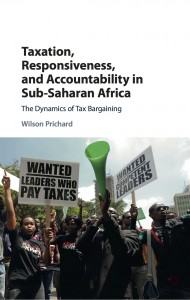
Taxation, Responsiveness and Accountability in Sub-Saharan Africa – The Dynamics of Tax Bargaining
It is increasingly argued that bargaining between citizens and governments over tax collection can provide a foundation for the development of responsive and accountable governance in developing countries. However, while intuitively attractive, surprisingly little research has captured the reality and complexity of this relationship in practice. This book provides the most complete treatment of the connections between taxation and accountability in developing countries, providing both new evidence and an invaluable starting point for future research. Drawing on cross-country econometric evidence and detailed case studies from Ghana, Kenya and Ethiopia, Wilson Prichard shows that reliance on taxation has, in fact, increased responsiveness and accountability by expanding the political power wielded by taxpayers. Critically, however, processes of tax bargaining have been highly varied, frequently long term and contextually contingent. Capturing this diversity provides novel insight into politics in developing countries and how tax reform can be designed to encourage broader governance gains.

The Global Governance of Climate Change: G7, G20 and UN Leadership
Failed efforts, centred in the United Nations, to allocate responsibility for climate change have resulted in a challenge now reaching crisis stage. Kirton and Kokotsis analyze the generation and effectiveness of four decades of intergovernmental regimes for controlling global climate change. They trace the global governance of climate change from its 1970s origins to the present and demonstrate the effectiveness of the plurilateral summit alternative grounded in the G7/8 and the G20.
Topics covered include:
– G7/8 and UN competition and convergence on governing climate change
– Kyoto obligations and the post-Kyoto regime
– The role of the G7/8 and G20 in generating a regime beyond Kyoto
– Projections of and prescriptions for an effective global climate change control regime for the twenty-first century.
This topical book synthesizes a rich array of empirical data, including new interview and documentary material about G7/8 and G20 governance of climate change, and makes a valuable contribution to understanding the dynamics of governing climate change. It will appeal to scholars, researchers, and policy makers interested in the dynamics behind governance processes within the intergovernmental realm.

The G8-G20 Relationship in Global Governance
How have the G8 and G20 summits performed since the G20 leaders began meeting in 2008? What has been the division of labour during their coexistence, and their comparative strengths and limitations? How can the future partnership could be improved to benefit the global community?
The contributors to this volume, edited by Marina Larionova and John Kirton, explain the recent evolution and performance of the G8 and G20 summits and their evolving empirical relationship. They consider the G8/G20 relationship with other actors engaged in global governance, notably the major multilateral organizations and civil society. They assess the summits’ effectiveness and accountability. And they identify, based on this empirical and analytical foundation, how the relationship can be improved for today’s tightly wired world.
Contributors include Peter Hajnal, University of Toronto; Ella Kokotsis, G7 and G20 Research Groups; Dries Lesage, Ghent University; Zia Qureshi, World Bank; Martin Gilman, Mark Rakhmangulov, Andrei Sakharov, Andrey Shelepov and Vitaly Nagornov of the National Research University Higher School of Economics.